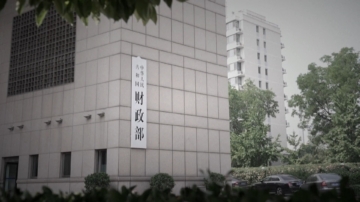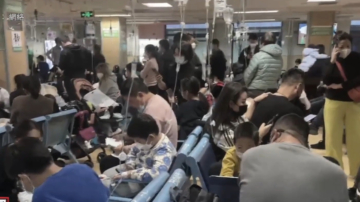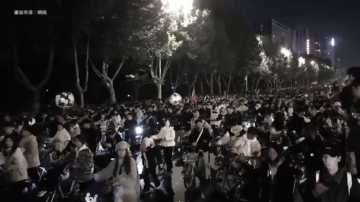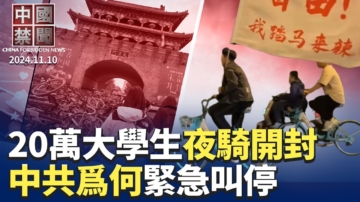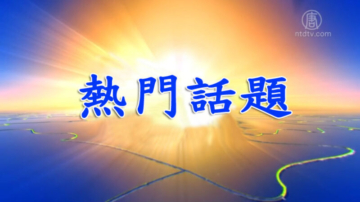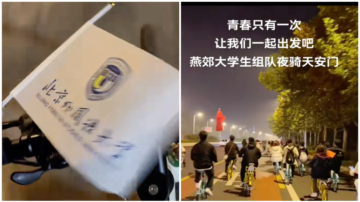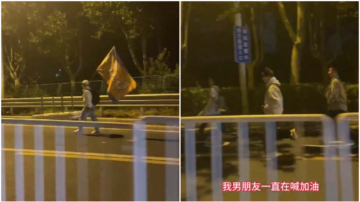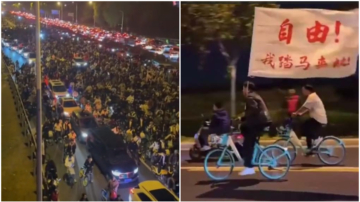【新唐人2014年02月14日讯】目前在南京进行正式访问的台湾“大陆委员会”主委王郁琦,12号上午,前往“中山陵”,向国父孙中山像献上花圈和祭文。祭文有“民国肇建 青天出现”“正视现实 民生为念”等内容。当天下午,王郁琦到“南京大学”演讲,以婉转的方式阐释民主政治理念。有分析指出,北京之所以和台湾官方进行正式会谈,是为了达到“统一台湾”这个终极目标。
11号,台湾“陆委会”主委王郁琦飞抵南京,与中共“国台办”主任张志军在南京进行历史性的“王张会”。12号上午,王郁琦一行人抵达“中山陵”,10点10分,王等人步入祭堂,向孙中山坐像行三鞠躬礼、并献上花圈和宣读祭文。祭文落款使用民国纪年,祭文提到了“三民主义 五权宪法”等台湾当局的基本政治立场。
据了解,王郁琦刻意选择10点10分献花,是为了凸显中华民国诞生于“双十”的含意。
随后,王郁琦在“中山陵”博爱广场发表简短演说,他强调,自己是以官员的身份向国父致敬。王郁琦表示,国父创建的“三民主义”和“五权宪法”,已在台湾具体实践,两岸政府应正视两岸现实,务实面对问题、解决问题。
王郁琦演讲期间,大陆“国台办”官员特意回避。据报导,当王郁琦说到,“国父孙中山先生创建了亚洲第一个民主共和国,现在中华民国已经103年了”时,旁边有一名大陆游客大声叫“好!”,但随即被安保人员带走。
美国中文杂志《中国事务》总编辑伍凡:“现在中华民国,虽然势力是弱小的,可是最大的强势是,他是一个民主自由的共和国,是一个灯塔,可以照亮中国,很多大陆老百姓向往台湾,一年有几百万人访问参观台湾,可以带回来很多理念和讯息,中共很害怕这个模式影响大陆,所以它巴不得一口把你吃掉。”
大陆媒体在报导王郁琦活动时,只提到王在祭文中有关“两岸人民,同属中华,九二共识,求同存异”等文字。中共党媒《央视》一度播出王呼吁“正视两岸现实”的谈话内容,但中午重播时,已被删除。
台湾警大公共安全系副教授董立文:“事实上,中共方面,对这一次的王郁琦到中国大陆去访问,是采取非常严苛的对待,连王郁琦说正视现实,都被删掉,所以两岸双方谈判条件,其实并不成熟,国、共两党之间的互信,都是非常脆弱的。或者北京方面并没有准备好要接受中华民国,他还是想要用消灭中华民国的方式来统一台湾。”
伍凡:“中共为了要达到长远的目标,统一台湾,一定要走上政治谈判这条路,所以一定要政府对政府谈判。中共为甚么不愿意承认中华民国,因为中华民国把毛泽东说是毛匪,是叛乱集团,你抢了中华民国的国号,把蒋介石赶到台湾,没有消灭掉他,可是人家现在比你走的还要好啊,所以他们现在很犹豫。”
当天下午,王郁琦到“南京大学”向200多名师生发表演讲,在谈到台湾目前的民主政治体制时,他以自嘲的口吻说,在台湾担任政府官员,是非常辛苦的。他说:“在台湾这种言论高度自由,记者无所不在、媒体无所不报和名嘴无所不知的环境中,再加上立法委员在国会的充分监督,在台湾担任政府官员的确相当辛苦。”
不过,王郁琦指出,这就是民主政治的核心价值。
董立文:“如果把王郁琦这次到中国大陆的访问,跟之前两次的辜振甫和汪道涵的会谈来比较,已经差很多了,倒退很多了。当年辜振甫是当面跟他们的最高领导人谈中华民国,谈民主自由的问题,但是这次王郁琦也只能够在中山陵前面谈所谓的中华民国,他谈民主自由,也是非常的婉转。”
今年11月,北京将举行亚太经合会(APEC)经济领袖会议,“马习会”能否成行引发关注。台湾“中央警察大学公共安全系”副教授董立文认为,从“王张会”可以看出“马习会”不太可能实现,一方面中共想用消灭“中华民国”的方式统一台湾,另一方面,北京不希望在国际上形成两个中国,或“一中一台”这种印象。
采访/易如 编辑/陈洁 后制/孙宁
Wang Yu-chi Visits Sun Yat-sen Mausoleum, Calls For Facing Up To Reality
Wang Yu-chi, Chairman of the Taiwan Mainland Affairs
Council is currently on an official visit to Nanjing.
On the morning of February 12, Wang Yu-chi placed a wreath
and read a funeral oration at Sun Yat-sen's Mausoleum.
The elegiac address said that, "the Republic
of China (ROC) is established; the sky appears",
"facing reality; with people's well-being in mind."
In the afternoon, Wang Yu-chi made a speech at Nanjing
University, tactfully explaining the concept of democracy.
Some analysts suggest that the purpose of this official
meeting between Beijing and Taiwan is ultimately
to achieve the goal of "reunification with Taiwan".
On February 11, Wang Yu-chi, the Chairman of the
Taiwan Mainland Affairs Council arrived in Nanjing.
He is conducting the historical "Wang-Zhang meeting"
with CCP Taiwan Affairs office Minister Zhang Zhijun.
On the morning of February 12, Wang Yu-chi
arrived for a visit at Sun Yat-sen's Mausoleum.
At 10:10am, they entered the Festival Hall, bowed
three times at Sun Yat-sen statue, and laid a wreath.
Wang then read the funeral oration, which mentioned
the Taiwanese authorities' basic political stance.
This included the "Three Principles, Five Powers Constitution."
It is said that Wang Yu-chi deliberately chose
10:10 for the wreath laying ceremony.
This was to signify 'Double Ten', the name for
the National Day of the Republic of China.
Later, Wang Yu-chi stressed his salute to the Founding
father in his speech at Bo Ai Square at Sun's Mausoleum.
Wang Yu-chi said the "Three People's Principles"
and "Five Powers Constitution" created by
Sun Yat-sen have been in practice in Taiwan.
He suggested the two governments should face
realities and solve problems pragmatically.
The Chinese Communist Party (CCP) Taiwan Affairs office
officials deliberately avoided Wang Yu-chi's lecture.
According to reports, when Wang Yu-chi mentioned,
"it has been 103 years since Sun Yat-sen founded
the ROC, the first democracy in Asia", there was
a mainland tourist who shouted "Good".
The tourist was immediately taken away by security.
Wu Fan, Chief Editor, US-based China Affairs magazine:
"Although the current ROC has only small power, its greatest
advantage is that it is a free and democratic republic.
This illuminates China like a lighthouse.
Each year, millions of mainland people visit Taiwan,
and bring back a lot of ideas and information.
The CCP is afraid of this influence to
the mainland and is anxious to dispel it."
Mainland media only mention that
"people on both sides belong to China".
When reporting on Wang Yu-chi's activities,
it described how the 1992 consensus may have
sought common ground and to reserve differences.
State-controlled CCTV news broadcasted Wang's
appeal of facing the reality between the two sides.
This report was omitted in lunchtimes news rebroadcasts.
Dong Liwen, Associate Professor, Taiwan Police
University Public Safety Department: "In fact,
the CCP is very strict with Wang Yu-chi's visit.
This is because they deleted Wang's “facing reality” speech.
So, it is not a good time for both parties to enter negotiation,
because mutual trust between the two parties is very fragile.
The Beijing authorities is not ready to accept the Republic
of China; instead it seeks to unify it through eradication."
Wu Fan: "To unify Taiwan and achieve long-term goals,
the CCP regime must enter political negotiation with Taiwan.
The CCP doesn't recognise the Republic of China (ROC).
This is because the ROC recognized Mao Zedong
as a Maoist bandit, and as a rebel group.
Mao Zedong stole the ROC's national title and drove
Chiang Kai-shek into Taiwan but did not destroy him.
The Taiwanese people are much better
off now, so the CCP is very hesitant."
In the afternoon, Wang Yu-chi made a speech at Nanjing
University, to more than 200 students and teachers.
He spoke about Taiwan's current democratic
political system, and joked that it is very hard
to be a government official in Taiwan.
"It is quite hard to be a government official in
Taiwan, with high levels of freedom of speech.
There are reporters everywhere, and
everything is reported by the media.
In addition, lawmakers supervise Congress."
Wang Yu-chi stressed that this is a core value of democracy.
Professor Dong Liwen: "It's much worse and
regressive to compare Wang Yu-chi's visit with
the Koo Chen-fu and Wang Daohan meetings.
In that year, Koo Chen-fu talked with the top
leader face to face about the issue of democracy
and freedom, and about Republic of China.
On this occasion, Wang can only mildly talk
about the Republic of China, democracy and
freedom in front of the Sun's Mausoleum."
In November 2014, Beijing will hold the Asia-Pacific
Economic Cooperation (APEC) Economic Leaders Meeting.
It has caused concern whether Ma and Xi will meet together.
Professor Dong Liwen believes it's not possible for the
meeting of Ma and Xi to follow from the Wang-Zhang meeting.
On one hand, the CCP wants
to unify Taiwan by eliminating ROC.
On the other hand, the Beijing authorities do not
want to form two China's, or "one China, one Taiwan".
Interview/YiRu Edit/ChenJie Post-Production/SunNing
11号,台湾“陆委会”主委王郁琦飞抵南京,与中共“国台办”主任张志军在南京进行历史性的“王张会”。12号上午,王郁琦一行人抵达“中山陵”,10点10分,王等人步入祭堂,向孙中山坐像行三鞠躬礼、并献上花圈和宣读祭文。祭文落款使用民国纪年,祭文提到了“三民主义 五权宪法”等台湾当局的基本政治立场。
据了解,王郁琦刻意选择10点10分献花,是为了凸显中华民国诞生于“双十”的含意。
随后,王郁琦在“中山陵”博爱广场发表简短演说,他强调,自己是以官员的身份向国父致敬。王郁琦表示,国父创建的“三民主义”和“五权宪法”,已在台湾具体实践,两岸政府应正视两岸现实,务实面对问题、解决问题。
王郁琦演讲期间,大陆“国台办”官员特意回避。据报导,当王郁琦说到,“国父孙中山先生创建了亚洲第一个民主共和国,现在中华民国已经103年了”时,旁边有一名大陆游客大声叫“好!”,但随即被安保人员带走。
美国中文杂志《中国事务》总编辑伍凡:“现在中华民国,虽然势力是弱小的,可是最大的强势是,他是一个民主自由的共和国,是一个灯塔,可以照亮中国,很多大陆老百姓向往台湾,一年有几百万人访问参观台湾,可以带回来很多理念和讯息,中共很害怕这个模式影响大陆,所以它巴不得一口把你吃掉。”
大陆媒体在报导王郁琦活动时,只提到王在祭文中有关“两岸人民,同属中华,九二共识,求同存异”等文字。中共党媒《央视》一度播出王呼吁“正视两岸现实”的谈话内容,但中午重播时,已被删除。
台湾警大公共安全系副教授董立文:“事实上,中共方面,对这一次的王郁琦到中国大陆去访问,是采取非常严苛的对待,连王郁琦说正视现实,都被删掉,所以两岸双方谈判条件,其实并不成熟,国、共两党之间的互信,都是非常脆弱的。或者北京方面并没有准备好要接受中华民国,他还是想要用消灭中华民国的方式来统一台湾。”
伍凡:“中共为了要达到长远的目标,统一台湾,一定要走上政治谈判这条路,所以一定要政府对政府谈判。中共为甚么不愿意承认中华民国,因为中华民国把毛泽东说是毛匪,是叛乱集团,你抢了中华民国的国号,把蒋介石赶到台湾,没有消灭掉他,可是人家现在比你走的还要好啊,所以他们现在很犹豫。”
当天下午,王郁琦到“南京大学”向200多名师生发表演讲,在谈到台湾目前的民主政治体制时,他以自嘲的口吻说,在台湾担任政府官员,是非常辛苦的。他说:“在台湾这种言论高度自由,记者无所不在、媒体无所不报和名嘴无所不知的环境中,再加上立法委员在国会的充分监督,在台湾担任政府官员的确相当辛苦。”
不过,王郁琦指出,这就是民主政治的核心价值。
董立文:“如果把王郁琦这次到中国大陆的访问,跟之前两次的辜振甫和汪道涵的会谈来比较,已经差很多了,倒退很多了。当年辜振甫是当面跟他们的最高领导人谈中华民国,谈民主自由的问题,但是这次王郁琦也只能够在中山陵前面谈所谓的中华民国,他谈民主自由,也是非常的婉转。”
今年11月,北京将举行亚太经合会(APEC)经济领袖会议,“马习会”能否成行引发关注。台湾“中央警察大学公共安全系”副教授董立文认为,从“王张会”可以看出“马习会”不太可能实现,一方面中共想用消灭“中华民国”的方式统一台湾,另一方面,北京不希望在国际上形成两个中国,或“一中一台”这种印象。
采访/易如 编辑/陈洁 后制/孙宁
Wang Yu-chi Visits Sun Yat-sen Mausoleum, Calls For Facing Up To Reality
Wang Yu-chi, Chairman of the Taiwan Mainland Affairs
Council is currently on an official visit to Nanjing.
On the morning of February 12, Wang Yu-chi placed a wreath
and read a funeral oration at Sun Yat-sen's Mausoleum.
The elegiac address said that, "the Republic
of China (ROC) is established; the sky appears",
"facing reality; with people's well-being in mind."
In the afternoon, Wang Yu-chi made a speech at Nanjing
University, tactfully explaining the concept of democracy.
Some analysts suggest that the purpose of this official
meeting between Beijing and Taiwan is ultimately
to achieve the goal of "reunification with Taiwan".
On February 11, Wang Yu-chi, the Chairman of the
Taiwan Mainland Affairs Council arrived in Nanjing.
He is conducting the historical "Wang-Zhang meeting"
with CCP Taiwan Affairs office Minister Zhang Zhijun.
On the morning of February 12, Wang Yu-chi
arrived for a visit at Sun Yat-sen's Mausoleum.
At 10:10am, they entered the Festival Hall, bowed
three times at Sun Yat-sen statue, and laid a wreath.
Wang then read the funeral oration, which mentioned
the Taiwanese authorities' basic political stance.
This included the "Three Principles, Five Powers Constitution."
It is said that Wang Yu-chi deliberately chose
10:10 for the wreath laying ceremony.
This was to signify 'Double Ten', the name for
the National Day of the Republic of China.
Later, Wang Yu-chi stressed his salute to the Founding
father in his speech at Bo Ai Square at Sun's Mausoleum.
Wang Yu-chi said the "Three People's Principles"
and "Five Powers Constitution" created by
Sun Yat-sen have been in practice in Taiwan.
He suggested the two governments should face
realities and solve problems pragmatically.
The Chinese Communist Party (CCP) Taiwan Affairs office
officials deliberately avoided Wang Yu-chi's lecture.
According to reports, when Wang Yu-chi mentioned,
"it has been 103 years since Sun Yat-sen founded
the ROC, the first democracy in Asia", there was
a mainland tourist who shouted "Good".
The tourist was immediately taken away by security.
Wu Fan, Chief Editor, US-based China Affairs magazine:
"Although the current ROC has only small power, its greatest
advantage is that it is a free and democratic republic.
This illuminates China like a lighthouse.
Each year, millions of mainland people visit Taiwan,
and bring back a lot of ideas and information.
The CCP is afraid of this influence to
the mainland and is anxious to dispel it."
Mainland media only mention that
"people on both sides belong to China".
When reporting on Wang Yu-chi's activities,
it described how the 1992 consensus may have
sought common ground and to reserve differences.
State-controlled CCTV news broadcasted Wang's
appeal of facing the reality between the two sides.
This report was omitted in lunchtimes news rebroadcasts.
Dong Liwen, Associate Professor, Taiwan Police
University Public Safety Department: "In fact,
the CCP is very strict with Wang Yu-chi's visit.
This is because they deleted Wang's “facing reality” speech.
So, it is not a good time for both parties to enter negotiation,
because mutual trust between the two parties is very fragile.
The Beijing authorities is not ready to accept the Republic
of China; instead it seeks to unify it through eradication."
Wu Fan: "To unify Taiwan and achieve long-term goals,
the CCP regime must enter political negotiation with Taiwan.
The CCP doesn't recognise the Republic of China (ROC).
This is because the ROC recognized Mao Zedong
as a Maoist bandit, and as a rebel group.
Mao Zedong stole the ROC's national title and drove
Chiang Kai-shek into Taiwan but did not destroy him.
The Taiwanese people are much better
off now, so the CCP is very hesitant."
In the afternoon, Wang Yu-chi made a speech at Nanjing
University, to more than 200 students and teachers.
He spoke about Taiwan's current democratic
political system, and joked that it is very hard
to be a government official in Taiwan.
"It is quite hard to be a government official in
Taiwan, with high levels of freedom of speech.
There are reporters everywhere, and
everything is reported by the media.
In addition, lawmakers supervise Congress."
Wang Yu-chi stressed that this is a core value of democracy.
Professor Dong Liwen: "It's much worse and
regressive to compare Wang Yu-chi's visit with
the Koo Chen-fu and Wang Daohan meetings.
In that year, Koo Chen-fu talked with the top
leader face to face about the issue of democracy
and freedom, and about Republic of China.
On this occasion, Wang can only mildly talk
about the Republic of China, democracy and
freedom in front of the Sun's Mausoleum."
In November 2014, Beijing will hold the Asia-Pacific
Economic Cooperation (APEC) Economic Leaders Meeting.
It has caused concern whether Ma and Xi will meet together.
Professor Dong Liwen believes it's not possible for the
meeting of Ma and Xi to follow from the Wang-Zhang meeting.
On one hand, the CCP wants
to unify Taiwan by eliminating ROC.
On the other hand, the Beijing authorities do not
want to form two China's, or "one China, one Taiwan".
Interview/YiRu Edit/ChenJie Post-Production/SunNing

